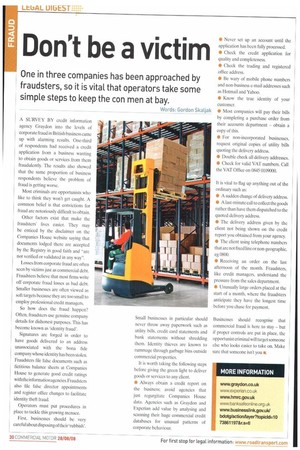Don't be a victim
Page 30

If you've noticed an error in this article please click here to report it so we can fix it.
One in three companies has been approached by fraudsters, so it is vital that operators take some simple steps to keep the con men at bay.
Words: Gordon Skatjak A SURVEY BY credit information agency Graydon into the levels of corporate fraud in British business came up with alarming results. One-third of respondents had received a credit application from a business wanting to obtain goods or services from them fraudulently. The results also showed that the same proportion of business respondents believe the problem of fraud is getting worse.
Most criminals are opportunists who like to think they won't get caught. A common belief is that convictions for fraud arc notoriously difficult to obtain.
Other factors exist that make the fraudsters lives easier. They may be enticed by the disclaimer on the Companies House website saying that documents lodged there are accepted by the Registry in good faith and "are not verified or validated in any way".
Losses from corporate fraud are often seen by victims just as commercial debt. Fraudsters believe that most firms write off corporate fraud losses as bad debt. Smaller businesses are often viewed as soft targets because they are too small to employ professional credit managers.
So how does the fraud happen? Often, fraudsters use genuine company details for dishonest purposes. This has become known as 'identity fraud'.
Signatures are forged in order to have goods delivered to an address una.ssociated with the bona fide company whose identity has been stolen. Fraudsters file false documents such as fictitious balance sheets at Companies House to generate good credit ratings with the information agencies.Fraudsters also file false director appointments and register office changes to facilitate identity theft fraud.
Operators must put procedures in place to tackle this growing menace.
First, businesses should be very careful about disposing of their 'rubbish'. Small businesses in particular should never throw away paperwork such as utility bills, credit card statements and bank statements without shredding them. Identity thieves are known to rummage through garbage bins outside commercial properties.
It is worth taking the following steps before giving the green light to deliver goods or services to any client.
• Always obtain a credit report on the business; avoid agencies that just regurgitate Companies House data. Agencies such as Graydon and Experian add value by analysing and scanning their huge commercial credit databases for unusual patterns of corporate behaviour. • Never set up an account until the application has been fully processed.
• Check the credit application for quality and completeness.
• Check the trading and registered office address.
• Be wary of mobile phone numbers and non-business e-mail addresses such as Hotmail and Yahoo.
• Know the true identity of your customer.
• Most companies will pay their bills by completing a purchase order from their accounts department — obtain a copy of this.
• For non-incorporated businesses, request original copies of utility bills quoting the delivery address.
• Double check all delivery addresses.
• Check for valid VAT numbers. Call the VAT Office on 0845 0109000.
It is vital to flag up anything out of the ordinary such as: • A sudden change of delivery address.
• A last-minute call to collect the goods rather than have them dispatched to the quoted delivery address.
• The delivery address given by the client not being shown on the credit report you obtained from your agency.
• The client using telephone numbers that are not fixed line or non-geographic, eg 0800.
• Receiving an order on the last afternoon of the month. Fraudsters, like credit managers, understand the pressure from the sales department.
• Unusually large orders placed at the start of a month, where the fraudsters anticipate they have the longest time before you chase for payment.
Businesses should recognise that commercial fraud is here to stay — but if proper controls are put in place, the opportunist criminal will target someone else who looks easier to take on. Make sure that someone isn't you




































































































































































